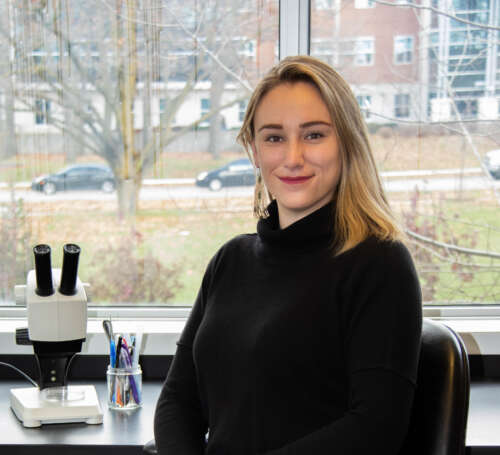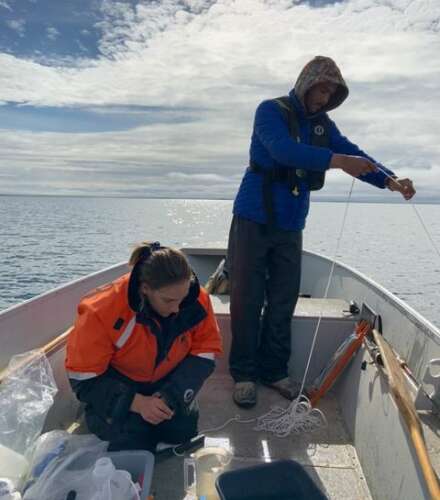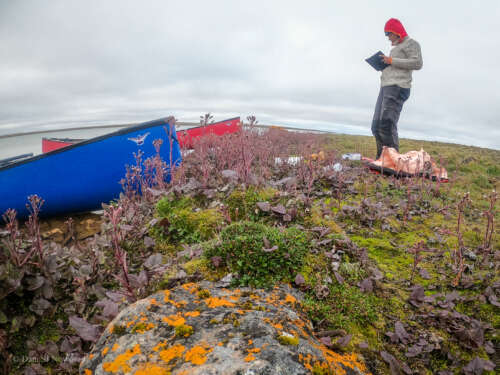Danielle Nowosad never expected to be studying science, much less advocating to make the field more accessible to communities historically excluded from it.

A Métis woman from Manitoba, she remembers being told by male professors during her undergraduate studies at the University of Winnipeg that “science wasn’t for her” and she should instead pursue art.
“That kind of gatekeeping almost kept me from even finding my undergrad program,” said Nowosad, now a University of Guelph PhD student in the Department of Integrative Biology.
“The reason why I stuck out my undergrad, even after those negative encounters, is because of the women in my department.”
Discovering elements of science such as the environment and geography changed Nowosad’s perception of the field, and her interest in it grew, prompting her to pursue graduate studies that brought her to U of G.
As she was simultaneously learning about her cultural history as a Red River Métis woman, it became clear to Nowosad that both science and Indigeneity were natural parts of her identity she had yet to fully embrace.
Western Science an extractive process in contrast with Indigenous cultural values
The intersection of the two dates back to the start of colonialism and still today, Nowosad said, a dissonance remains that has excluded Indigenous students from pursuing science and created mistrust among Indigenous communities who feel academia clashes with them, often disrespectfully.
“Western science is very extractive,” she explained. “It’s a form of colonialism in the way that it has been executed in the past. Academia and western science have traditionally harmed — actively and passively — BIPOC (Black, Indigenous and People of Colour communities) communities.”

As a result, Nowosad has prioritized making science accessible in her graduate studies, expanding her approach beyond research and the classroom to the broader community.
In 2020, she reached out to science teachers where she was conducting research in Cambridge Bay, on Victoria Island, Nunavut, asking whether local youth might need hygiene products. After contacting Canadian companies, she orchestrated a donation of 100 menstrual cups, medical brochures and workbooks from Diva Cups.
When the pandemic slowed the donation drive, Nowosad kept the effort going after learning of another community organization in need, sending another 300-lb. delivery of hygiene items.
As a result of her efforts, including many public lectures and talks about science in the North, Nowosad was honoured with the Kishaadigeh “She Who Guards The Lodge” Award in 2021.
In her view, conducting research that matters to the people whose lands you’re on as a guest, building relationships and maintaining respect and inclusivity are often missing from practice. “One thing Western science does really poorly is reciprocity,” she said, contrasting with Indigenous values to show gratitude for sharing gifts such as knowledge.
The Indigenous Undergraduate Orientation Package is born
“I’m racially white,” Nowosad said of the way she presents to the world. She believes that privilege is why she has limited experience of any direct racism or discrimination, and, in her estimation, underpins her drive to advocate for change within academia.
Dr. Melissa Perreault, a Métis professor in neuroscience at U of G in the departments of Biomedical Sciences and Integrative Biology, asked Nowosad if she’d be interested in leading a project to develop a communications strategy for incoming Indigenous undergraduate students to the College of Biological Science (CBS).

Nowosad took the lead on what became the Indigenous Undergraduate Orientation Package, engaging Indigenous undergraduate students in discussions and developing the material based on their needs. It will be distributed to those who self-declare as Indigenous when they begin a program in CBS and will be available at Indigenous Student Services.
“Dani encompasses multitudes,” said Dr. Mazyar Fallah, dean of the College of Biological Science. “One of the biggest impacts you can have is to drive education,” he said, pointing to how Nowosad’s advocacy reaches beyond her own studies.
“She’s one of those people who I think not only pays it forward, but also pays it sideways,” to benefit both current and future students, he said.
Fallah likened Nowosad to a pebble tossed into the water, creating ripples and waves atop the surface as well as beneath, “really changing the makeup of the place” as her advocacy becomes part of conversations taking place at U of G at both the department and the college levels.
“She brings her own perspectives from her own lived experience that I think is very important as a voice in bringing the change we need to make across the University,” he continued. “I think we need the representation of women in science and the representation of Indigenous people in science.”
Sexism, misogyny prevalent in certain STEM fields
There are just a handful of Indigenous faculty and grad students at U of G, so, “opening up and making sure that the door stays open behind us, for others, is really important,” Nowosad said.
“There are several non-binary and female faculty in my department who are very vocal and really are active in fighting for equal opportunity and equal treatment, no matter who you are, and I’ve drawn a lot of inspiration from them.”
Sexism and misogyny are still prevalent, Nowosad said, “especially in spaces like ecology and Arctic science that are very white.”
With so few Indigenous people in the STEM (science, technology, engineering and mathematics) fields, Perreault said having someone like Nowosad to advocate for change will help foster inclusion that is “sorely needed.”
The Métis have had their own unique challenges distinct from those of First Nations and Inuit communities, Perreault said, and Nowosad’s ties to both Western and Indigenous worlds position her well to bridge the two and make her a role model.
“She has overcome so many barriers, and her success means so much not only to herself, but to those that follow,” Perreault said. “Students will look up to people like Dani and see that they belong there.”
